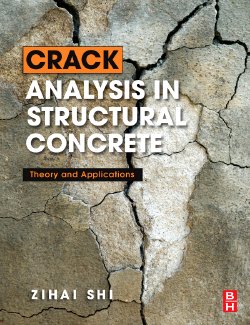Crack Analysis in Structural Concrete from Elsevier

This new book on the fracture mechanics of concrete focuses on the latest developments in computational theories, and how to apply those theories to solve real engineering problems. Zihai Shi uses his extensive research experience to present detailed examination of multiple-crack analysis and mixed-mode fracture.
Compared with other mature engineering disciplines, fracture mechanics of concrete is still a developing field with extensive new research and development. In recent years many different models and applications have been proposed for crack analysis; the author assesses these in turn, identifying their limitations and offering a detailed treatment of those which have been proved to be robust by comprehensive use.
After introducing stress singularity in numerical modelling and some basic modelling techniques, the Extended Fictitious Crack Model (EFCM) for multiple-crack analysis is explained with numerical application examples. This theoretical model is then applied to study two important issues in fracture mechanics - crack interaction and localization, and fracture modes and maximum loads. The EFCM is then reformulated to include the shear transfer mechanism on crack surfaces and the method is used to study experimental problems.
With a carefully balanced mixture of theory, experiment and application, Crack Analysis in Structural Concrete is an important contribution to this fast-developing field of structural analysis in concrete.
Click here for further information
Terms
While we only use edited and approved content for Azthena
answers, it may on occasions provide incorrect responses.
Please confirm any data provided with the related suppliers or
authors. We do not provide medical advice, if you search for
medical information you must always consult a medical
professional before acting on any information provided.
Your questions, but not your email details will be shared with
OpenAI and retained for 30 days in accordance with their
privacy principles.
Please do not ask questions that use sensitive or confidential
information.
Read the full Terms & Conditions.